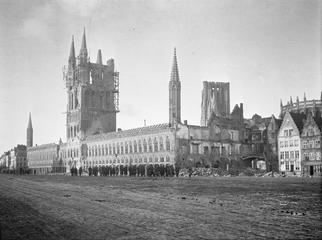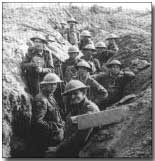Germans Misread Russian Forces, Losing War in the East.
In West, British Retake Ypres.
Special to The Great War Project
(18-19 October) On this dreary exhausting day one hundred years ago, there is much action on both the Western and the Eastern Fronts, at key strategic locations, Ypres in Belgian and Warsaw in Poland.
In the West, British forces recapture the strategic Belgian town of Ypres from the Germans.
According to historian Martin Gilbert, “the British now planned to push the Germans back through Belgium.” But after just a few miles in retreat, the Germans firm up resistance and halt the British advance. The Germans quickly reinforce their units.
The British get wind of the reinforcements from Belgian refugees fleeing the city and from British air reconnaissance.
The Germans occupy the town of Menin, just twelve miles from Ypres, and the British commander in the field, General Henry Rawlinson, decides not to press the attack, despite receiving orders to “move on Menin.”
On the same day the British retake the French town of Armentieres.
Among the British soldiers killed at Armentieres is Norman Leslie, Winston Churchill’s cousin. Still evoking the glory of the war, Churchill, at this time the head of naval operations in his capacity as First Lord of the Admiralty, writes a letter of condolence to Leslie’s mother.
“The British army has in a few weeks of war revived before the whole world the glories of Agincourt and Blenheim and Waterloo,” Churchill writes. “and in this Norman has played a part.”
On the Eastern Front, a battle is shaping up for Warsaw, the capital of Russian-occupied Poland.
Warsaw is the third largest city in the Russian Empire, a key railway hub, and “the natural headquarters of the Russian army,” observes historian Geoffrey Wawro. “Its loss would force the Russians to pull back their entire front and relocate general headquarters to some peripheral place.”
But the German force is outmatched, observes Wawro.
“The Germans had misread Russian intentions and were forced to withdraw from Warsaw.”
“Now the Germans no less than the Austrians, could feel the shuddering approach of the Russian steamroller.”
The Russians deploy troops in force around Warsaw. The German commanders, unaware of the strength of Russian forces there, press on toward the city.
The Germans are also hampered, writes war historian John Keegan, by the slow pace of their army’s advance. They have no better mobility, he notes, “than the feet of the soldiers and horses.” The weather is terrible, the roads deep in mud.
Finally the German generals realize their army “is in imminent danger of defeat if [they] push on towards Warsaw.” So they withdraw their forces. In several other efforts to counter-attack, the Germans are also outflanked.
Keegan concludes, “the battle of Warsaw was an undoubted Russian victory.”
“It demonstrated the Russians’ superiority in the warfare of maneuver and even in the strategy of deception.
Still the battle for Warsaw inflicts pain on both sides. “A few thousand more men had perished,” writes historian Max Hastings, “for no significant advantage to either.”



